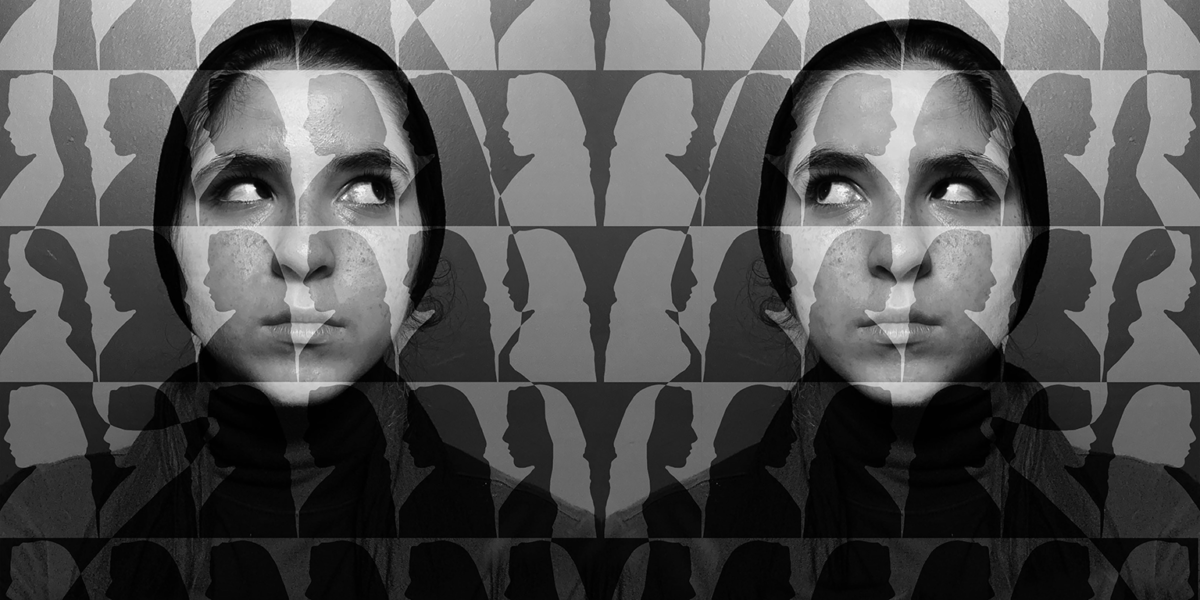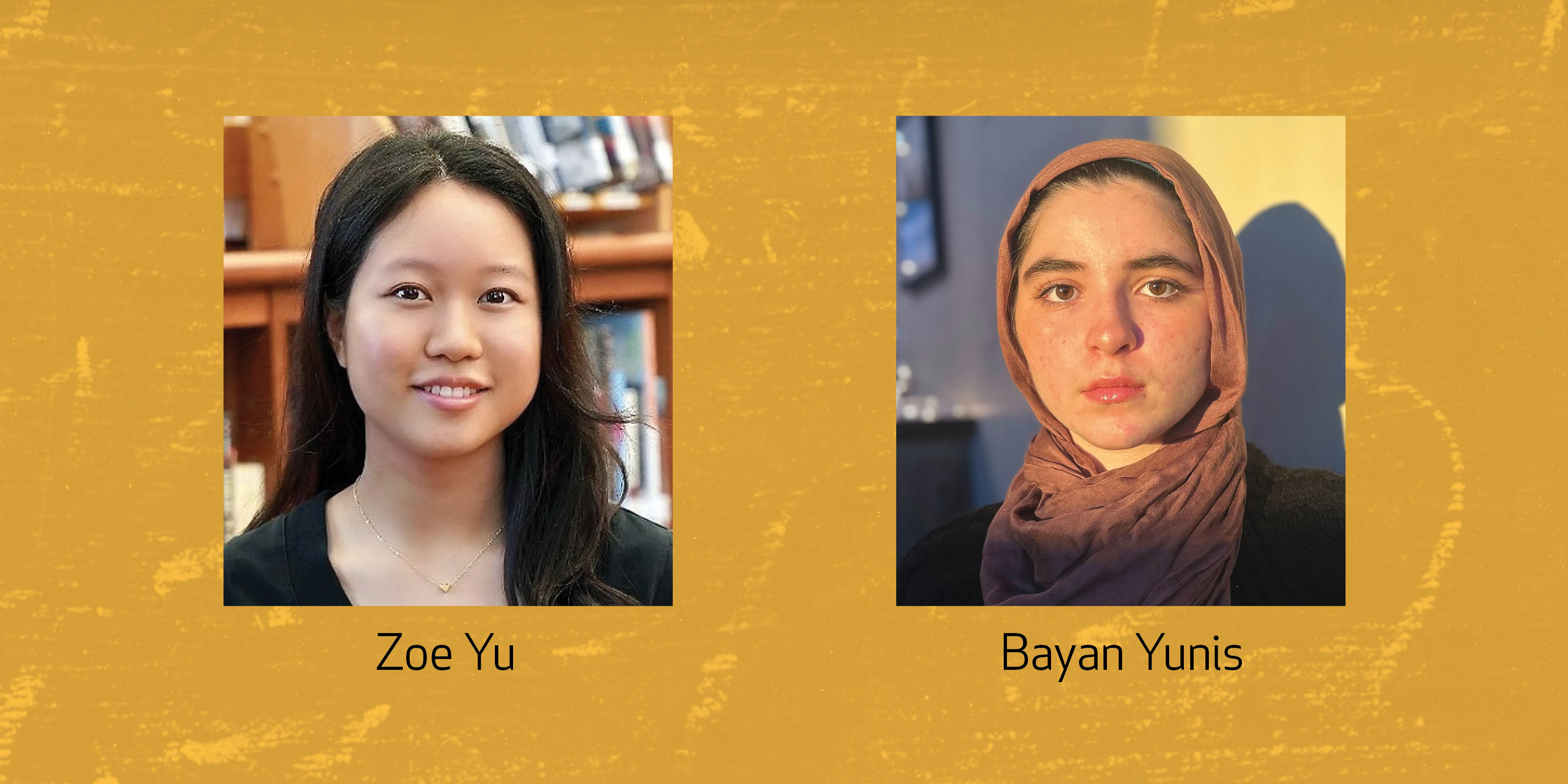A Gold Medal Portfolio Award is the highest honor students can receive in the Scholastic Art & Writing Awards. Jurors choose portfolios by high school seniors whose works best represent the Scholastic Awards’ judging criteria: originality, skill, and the emergence of a personal vision or voice. These remarkable artists and writers will each receive a $12,500 scholarship.
For the next few weeks, we’ll be profiling the 2023 Gold Medal Portfolio recipients. Next up are Zoe Yu and Bayan Yunis.
Zoe Yu
At first glance, my pieces may seem like a sprawling, disparate mass of work. There are profiles, essays, narratives. There’s a critique on the reality show “The Bachelor,” an op-ed about the gun violence epidemic in schools, and an editorial about saving endangered languages. You might ask me what finding love on national television has to do with the repression of native tongues under imperialism, and I’d answer simply: it’s culture.
Internet culture. Political culture. Familial culture. My writing is an exploration into each and every one of culture’s dictionary definitions: how gun culture has forced schools to bear the brunt of violence, how influencer culture allows public figures to reinvent their images at the click of a button, how youth culture is battling journalism culture to make young voices heard. I dive deep into individual sources of culture—Caroline Calloway, the original “Queen of Instagram,” for instance—and analyze culture within communities and groups of people, too. And then I investigate how this cultural programming has shaped us, in good ways and bad, when it’s obvious and when it’s not. How it can bitterly divide us, but also about how it can unite us.
And, of course, culture has shaped, and continues to shape, how I write. As an immigrant, I sometimes sneak in grammar errors or too many commas into my work. As a Gen-Z’er, I’m fascinated with the role of social media in our lives. As a student writing about education, I firmly believe that the most powerful stories come directly from the storyteller. Beyond simply covering the subject matter of culture, I’ve found my own—and I hope that my writing is interpreted differently by each reader, so that they may discover their own meaning of culture in my work.
Growing up and Writing about It: Why Young Voices Matter
CRITICAL ESSAY
Zoe Yu, Grade 12, The Woodlands College Park High School, The Woodlands, TX. Leah George, Educator. Region-at-Large, Affiliate. Gold Medal Portfolio Award, The Dav Pilkey Writing Portfolio Award
“Unfortunately, students’ brains are not fully developed until they are 25 or 26 years old.”
I’m frantically combing through Facebook before the bell rings for class. My op-ed on Covid in schools had gone live that week, and it had become a sort of ritual to check the response on social media in between club meetings, quizzes, and homework. I had written about a highly politicized topic, so I was braced for scathing pushback—but scrolling through the thousands of comments, I realized that almost no one was discussing what I had written about, and almost everyone was discussing my age.
Under the article, someone had suggested that I get a summer job in the real world instead of typing up fake news, throwing in a “Don’t you have a math test to study for?” Another told me sympathetically that my young, impressionable mind had been brainwashed by my parents, peppering their advice with “sweetheart” and “child.” Some comments even questioned if I had written the article myself—“Middle-aged hands typed this,” “So what kid made money for this interview?”—and a far-right media organization called me a propagandist with a teenage persona. When I tapped into the comments section of someone who had shared the article with an angry emoticon, I saw that her friend had chimed in, too: “My sis-in-law owns a dance studio & says kids’ brains have definitely been affected . . . sad & scary as hell! . . . muzzled = lack of oxygen to the brain . . .”
As I saw my writing sabotaged by my age in real time, I wondered how many stories had gone untold because of responses like these. How many young writers had written a piece that was important to them, only to be met with scorn and condescension? How many valuable stories had been lost in the shuffle of “You’re just a kid”? And how many more would be?
When we aren’t being told that we lack the life experience and wisdom to write, we’re being dismissed as too childish, ignorant, or naive to know what’s going on, too influenced by outside forces to be able to think for ourselves. What on the surface may read like the casually cruel comments so often thrown around on the internet are symptomatic of a deeper issue: Young writers aren’t taken seriously. Our writing is routinely discounted—not because of the message, or the sources, or anything regarding the actual content of a piece—but simply because of our age. This is despite young writers’ covering topics that have a direct impact on us: At the same time that we’re growing up, navigating adolescence, and figuring out our place in the world, we’re also writing about it.
Who is best suited to write about the student debt crisis if not a low-income teen struggling to pay for his education? Whose story is it to tell of being five months pregnant at prom if not a teen mother’s? Who should be tasked with profiling the stories of victims of the school gun violence epidemic if not high school students who endure active-shooter drills every school year? The act of listening to young people and giving us the space to write doesn’t just let us vocalize our perspectives and validate our opinions; it also brings an authentic portrayal of the unique issues that we’re facing as we face them. Whether we have a curfew or not, and even if our history project is due on Monday, we should be able to write without being written off.
From reporting on the coronavirus to dissecting culture and identity, we’re doing serious work. It’s exactly what we need: responsible coverage of what’s happening right now from the people living through it. We can’t brush these stories off, even if—especially if—they’re told by teenagers.
Yet we are. In an industry where online harassment—especially of women— is expected, biting insults aren’t uncommon, but for many young writers, they hit hard. “A constant barrage of ageist comments can be really harmful,” Miceala Morano, a high school senior and an award-winning writer and slam poet, tells me. “I’ve had friends who have stopped writing completely because a comment was so rude that it destroyed their sense of confidence in themselves and their work.” Opening up my Twitter DMs, with readers questioning my credibility and declaring I was more fit to watch “Dora the Explorer,” I felt for young writers who face unnecessarily harsh critics. We can come across as self-assured, but in a time when many of us are just starting to summon up the courage to write publicly, it takes only one seemingly offhand remark to undermine days of writing, researching, and reporting.
Ageism also extends past patronizing comments into tangible consequences. In Kentucky, high school journalists were shut out of a 2019 roundtable discussion on, ironically, education. Unable to cover the event, they wrote an editorial instead, asking, “How odd is it that even though future generations of students’ experiences could be based on what was discussed, that we, actual students, were turned away?” It’s demoralizing, and all too familiar, to see seasoned writers and professional journalists entering an event as student journalists are held back, watching from the sidelines when we should be in the thick of the action. We’re expected to prove ourselves without ever being given the chance to do so.
Rainier Harris, a freshman at Columbia University who wrote for The New York Times in his senior year of high school, knows this frustration all too well: He says he’s been pushed aside by editors who deem young journalists too inexperienced to cover a story, and has been offered less than what he feels is deserved for the quality of his work. Somewhat contradictorily, it seems editors expect experience without ever allowing young writers to build it—which is the exact opposite mentality of what’s needed to allow young writers to bring their stories into the fray. “Young people have amazing stories to share, and we [should] be telling them,” Harris says.
Adding the word “teen” before “writer” or “student” before “journalist” shouldn’t condemn a piece of writing to be perceived as amateur or inane, and this attitude about age dictating worthiness is a disservice to the billions of young people across the globe. As we create important, meaningful work, our opinions and voices should be treated with respect, regardless of how old we might be. “Young writer” isn’t an oxymoron.
Bayan Yunis

Many of the inter- and intrapersonal struggles that I experience have recurring effects on my mental and physical well-being. To represent the personal nature of my work, I exclusively utilize my own self-portrait to convey that I pull from my own experiences rather than the general experiences of humanity (though, that’s not to say that the struggles that I experience are exclusively mine). The frequency with which I experience a specific concept, whether it’s grief or a lack of privacy, is conveyed through the intentional inclusion of more self-portraits to display its prevalence. Each one of my pieces is influenced by a specific struggle that I’m coping with.
Featured image: Bayan Yunis, Cut from the Same Cloth, Photography. Grade 12, Carroll High School, Fort Wayne, IN. Nicole Croy, Educator; The Fort Wayne Museum of Art, Affiliate. Gold Medal Portfolio, The Harry and Betty Quadracci Art Portfolio
To see more Gold Medal Portfolio recipients, past and present, visit our Eyes on the Prize series.

